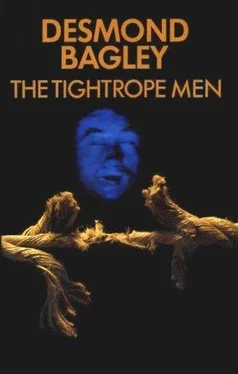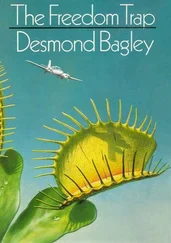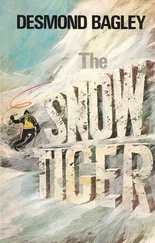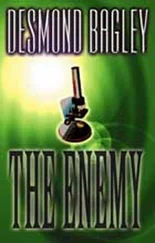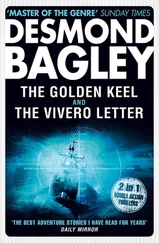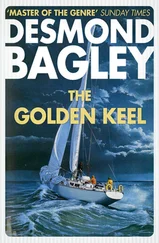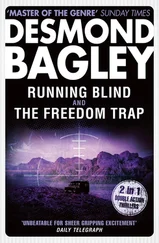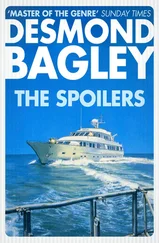Desmond Bagley - The Tightrope Men
Здесь есть возможность читать онлайн «Desmond Bagley - The Tightrope Men» — ознакомительный отрывок электронной книги совершенно бесплатно, а после прочтения отрывка купить полную версию. В некоторых случаях можно слушать аудио, скачать через торрент в формате fb2 и присутствует краткое содержание. Город: London, Год выпуска: 1973, ISBN: 1973, Издательство: HarperCollins, Жанр: Прочие приключения, на английском языке. Описание произведения, (предисловие) а так же отзывы посетителей доступны на портале библиотеки ЛибКат.
- Название:The Tightrope Men
- Автор:
- Издательство:HarperCollins
- Жанр:
- Год:1973
- Город:London
- ISBN:978-0-00-221847-4
- Рейтинг книги:4 / 5. Голосов: 1
-
Избранное:Добавить в избранное
- Отзывы:
-
Ваша оценка:
- 80
- 1
- 2
- 3
- 4
- 5
The Tightrope Men: краткое содержание, описание и аннотация
Предлагаем к чтению аннотацию, описание, краткое содержание или предисловие (зависит от того, что написал сам автор книги «The Tightrope Men»). Если вы не нашли необходимую информацию о книге — напишите в комментариях, мы постараемся отыскать её.
The Tightrope Men — читать онлайн ознакомительный отрывок
Ниже представлен текст книги, разбитый по страницам. Система сохранения места последней прочитанной страницы, позволяет с удобством читать онлайн бесплатно книгу «The Tightrope Men», без необходимости каждый раз заново искать на чём Вы остановились. Поставьте закладку, и сможете в любой момент перейти на страницу, на которой закончили чтение.
Интервал:
Закладка:
‘He’d probably fall off,’ said Denison. He began to get a glimmer of what these two were getting at.
Lyng leaned his elbows on the desk. ‘A man called Merikken invented something which had no application when he invented it. Now it turns out to be something capable of carving up missiles in mid-flight. Mr Denison, supposing Russia developed this weapon — and no one else. What do you think might happen?’
‘That depends on the ratio of hawks to doves in the Russian government, but if they were sure they could stop an American strike they might just chance their arm at an atomic war.’
‘Meyrick blabbed in Stockholm before he came to us,’ said Carey. ‘And the news got around fast. Our problem was that the papers were in Russia, and if the Russians got to them first they’d hold on tight. Well, the Russians have got the papers — but so have we, in photocopy.’
Denison was suspicious. ‘But you sold them to the Americans.’
‘Kidder was a Russian,’ said Carey. ‘I let it be known that I was willing to be bought, but the Russians knew I’d never sell myself to them. After all, I do have certain standards,’ he said modestly. ‘So they tried to pull a fast one. I didn’t mind.’
‘I don’t quite understand,’ said Denison.
‘All right,’ said Carey. ‘The Russians have the secret and they’ll know, when we tell them, that we have it, too, and that we’ll pass it on to the Yanks. And we’ll let the Yanks know the Russians have it. We drop the heavy weight on both ends of the balancing pole.’
Lyng spread his hands. ‘Result — stalemate. The man remains balanced on the tightrope.’
‘There were a lot of others involved but they were small fry,’ said Carey. ‘The Czechs and the West Germans.’ He smiled. ‘I have reason to believe that the man who bopped you on the head at Kevo was an Israeli. The Israelis would dearly like to have a defence against the SAM III missiles that the Syrians are playing around with. But, really, only America and Russia matter. And maybe China.’ He glanced at Lyng.
‘Later, perhaps.’ Lyng stared at Denison. ‘This country has just lost an Empire but many of its inhabitants, especially the older ones, still retain the old Imperial habits of thought. These modes of thought are not compatible with the atomic era but, unfortunately, they are still with us. If it became public knowledge that we have handed over to the Russians what the newspapers would undoubtedly describe as a super-weapon then I think that one of the minor consequences would be the fall of the government.’
Denison raised his eyebrows. ‘Minor!’
Lyng smiled wintrily. ‘The political complexion of the government of the day is of little interest. You must differentiate between the government and the state; governments may come and go but the state remains, and the real power is to be found in the apparatus of state, in the offices of Whitehall, in what Lord Snow has so aptly described as the corridors of power.’
Carey snorted. ‘Any day I’m expecting a journalist to write that the winds of change are blowing through the corridors of power.’
‘That could very well happen,’ said Lyng. ‘The control of power in the state is not monolithic; there are checks and balances, tensions and resistances. Many of the people I work with still hold on to the old ideas, especially in the War Office.’ He looked sour for a moment. ‘Some of the senior officers in the Navy, for instance, were destroyer commanders during World War II.’
His hand shot forward, his finger pointing to the folder in Denison’s lap. ‘Can you imagine the attitude of such men, steeped in the old ideas, when they are expected to issue orders to young officers to sink one type of enemy submarine and not another?’ He shook his head. ‘Old habits die hard. They’re more likely to say, in the old tradition, “Full speed ahead, and damn the torpedoes.” They fight to win, forgetting that no one will win a nuclear war. They forget balance, and balance is all, Mr Denison. They forget the man on the tightrope.’
He sighed. ‘If the news of what has been done in Finland were to be disclosed not only would the present government fall, a minor matter, but there would be a drastic shift of power in the state. We, who strive to hold the balance, would lose to those who hold a narrower view of what is good for this country and, believe me, the country and the world would not be the safer for it. Do you understand what I am saying, Mr Denison?’
‘Yes,’ said Denison. He found that his voice was hoarse, and he coughed to clear it. He had not expected to be involved in matters of high policy.
Abruptly the tone of Lyng’s voice changed from that of a judge reviewing a case to something more matter-of-fact. ‘Miss Meyrick made a specific threat. She derided the efficacy of “D” notices and said that the students of twenty universities would not be bound by them. I regret to say that this is probably quite true. As you know, our student population — or some sections of it — is not noted for its coolheadedness. Any move towards implementing her threat would be potentially disastrous.’
‘Why don’t you talk to her about it?’ said Denison.
‘We will — but we believe you have some influence with her. It would be a pity if Miss Meyrick’s anger and compassion were to cause the disruption I have described.’
Denison was silent for a long time then he sighed, and said, ‘I see your point. I’ll talk to her.’
‘When will you see her?’ asked Carey.
‘I’m meeting her at the Horse Guards at twelve o’clock.’
‘That’s in ten minutes. You talk to her, and I’ll have a word with her later.’ Carey stood up and held out his hand. ‘Am I forgiven?’
‘I wanted to kill you,’ said Denison. ‘I very nearly did.’
‘No hard feelings,’ said Carey. ‘I seem to remember hitting you pretty hard.’
Denison got up and shook Carey’s hand. ‘No hard feelings.’
Lyng smiled and busied himself with the contents of a slim briefcase, trying to efface himself. Carey stood back and looked at Denison critically. ‘I wouldn’t have believed it — the change in you, I mean.’
Denison put his hand to his face. ‘Iredale unstuck the eyelid — that was easy — and took away the scar. He had a go at the nose and that’s still a bit tender. We decided to leave the rest — getting the silicone polymer out would amount to a flaying operation so we gave it a miss. But the beard covers up a lot.’ He paused. ‘Who did it, Carey?’
‘I don’t know,’ said Carey. ‘We never did find out.’ He looked at Denison quizzically. ‘Has Iredale’s handiwork made much difference with Lyn?’
‘Er... why, yes... I think...’ Denison was unaccountably shy.
Carey smiled and took out a notebook. ‘I’ll need your address.’ He looked up, ‘At the moment it’s Lippscott House, near Brackley, Buckinghamshire. Can I take it that will be your address until further notice?’
‘Until further notice,’ said Denison. ‘Yes.’
‘Invite me to the wedding,’ said Carey. He put away his notebook and glanced through the window down into Whitehall. ‘There’s Lyn,’ he said. ‘Admiring the horses. I don’t think there’s any more, Giles. I’ll keep in touch. If you ever need a job, come and see me. I mean it.’
‘Never again,’ said Denison. ‘I’ve had enough.’
Lyng came forward. ‘We all do what we think is best.’ They shook hands. ‘I’m glad to have met you, Mr Denison.’
When he had gone Lyng put his papers back into his briefcase and Carey stood at the window and lit his pipe. It took him some time to get it going to his satisfaction. Lyng waited patiently, and then said, ‘Well?’
Читать дальшеИнтервал:
Закладка:
Похожие книги на «The Tightrope Men»
Представляем Вашему вниманию похожие книги на «The Tightrope Men» списком для выбора. Мы отобрали схожую по названию и смыслу литературу в надежде предоставить читателям больше вариантов отыскать новые, интересные, ещё непрочитанные произведения.
Обсуждение, отзывы о книге «The Tightrope Men» и просто собственные мнения читателей. Оставьте ваши комментарии, напишите, что Вы думаете о произведении, его смысле или главных героях. Укажите что конкретно понравилось, а что нет, и почему Вы так считаете.
